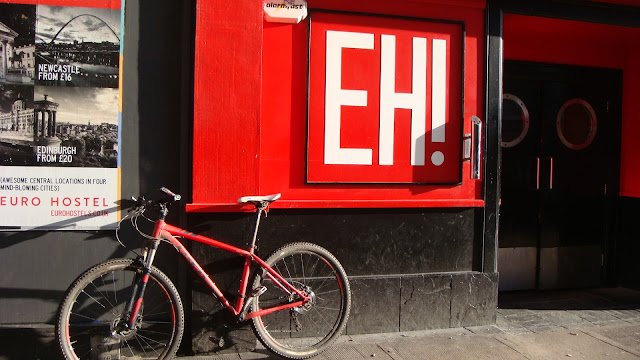You can't imagine how intensely I was living. How good it is to be on your own. You climb up and look back at your boat. There is the sea, the wind, the sound of the water. Above all, the beauty of the boat surging forward. On your own you can discover who you really are.
Bernard Moitissier
I have heard nothing. I have heard nothing. Donald Crowhurst
Around the world without stopping, eight months alone, completely alone, with all that that entails... Everything revolved around that word alone: the nervous tension, the food, the exhaustion, my whole outlook. Things which mattered at the start didn't matter at all now. The rules of the game had changed. The rules within me had changed.
Bernard Moitissier
Watching the fantastic documentary Deep Water (2006) the other evening about the amateur sailor Donald Crowhurst and his ill-fated attempt to circumnavigate the earth, I understood that 'to be alone in the open' is not just something I have felt (and celebrated through Being) in the hills and moors above my home city of Glasgow, but is a state of grace that is felt by many who have confronted the true nature of the Self. Whether on the planet's vast oceans, or in its deserts or mountain ranges, there is this sense of the boundless and limitless. And a rare glimpse of You.
Where a city has definite and definable limits the Self does not, in spite of our society's attempts to fashion otherwise. Yet, we have grown up in a world of hubris and arrogance against Nature (and nakedness) where we have not just been named (and thus specified quite unnaturally beyond the species) but where we have been fashioned and manufactured (by vestments and educations) to excel within that sphere of 'presumption towards the gods' (as in the dominion and control over all other entities). Through the remit of science and progress, we have (pathologically) measured and calculated, defined and demarcated, and in so doing lost the immense nature of the Self. One might suggest that it is nothing more than an aberration of Mind to want to measure everything, yet this, before anything else, is the mandate of the economic system we labour under. And the first 'thing' to be measured is the self. (There's a reason why the greatest horror film ever made is called The Thing!)
But how can you measure the immense? Where does the entity start and stop? A creature's perceptions and imaginations are proof that we are not limited to the sealed envelope of skin and skull. Only through being demented, and removed from Mind can we begin to package the entity with a straight face. Nowadays, dementia is a real problem and will prove to be an even bigger one as we continue through the 21st century in a similar 'Mindset' as to the previous two. Indeed, one might suggest that it is precisely because 'Mind' has set (and been awarded a definite article for its troubles) that we now find ourSelves in so much conflict.
The mind is now a bona fide commodity which trades itself on the global market through the purchase and the sale of its Self.
Yet, the mind is not Mind, and never will be until it can let go of itself, and embrace its immensity. It is this immensity that Crowhurst 'saw' towards the end of his voyage whilst penning his 25000 word thesis on the Cosmic Being. His 'racing' competitor Moitissier saw it too when he finally decided to abandon the race and return to the Pacific, and to the immense peace of the open seas, abandoning his waiting city-ridden wife and children in the process.
Part of this peace no doubt comes from the 'desert aspect' of being at sea (nothing reflected back to confirm the small-minded ago), and the fact that there are no 'pointers' to tell you that you are a 'man'. The scene is natural and immense: alone in the Open; primal scenery, no pylons, no roads, not a trace of modernity or progress (even the boat is primal, if we can compare it to an ancient dugout)... Primacy of Being then emerges naturally out of the primal setting. It is why so many go 'mad' when involved with such 'indefinition' and indifference. Yet this 'madness' is actually a clarifying of the immense Self, the in-difference of a violent ocean revealing the same-ness (or equally, identitylessness and voidness) that underlies the All.
It is an area full of paradox, the Open. The power of space enters, as does the power of privacy in plain sight. We have become too crowded as a species, and too scared of our immensity, and consequently sought safety in the herd. Yet, it is only through solitude, preferably in the Open, that one will come round to (and come to) the truth, and/or indeed love.
As the Mexican film-maker Guillermo Del Toro insightfully remarked today in an interview with Radio 4's Francine Stock promoting his new film The Shape of Water:
We cannot live without water, we are 90% water... And I must say, we cannot live without love... Seriously, we are 90% love; when you are in love you don't need anything, and this is not just a song The Beatles came up with, it's a fact. When you need the car, need the salary, need the recognition, you are 100% not in love. When you are in love, not just infatuation, real love, you really don't need anyone or anything except that person.
That 'person' is the Open...

















